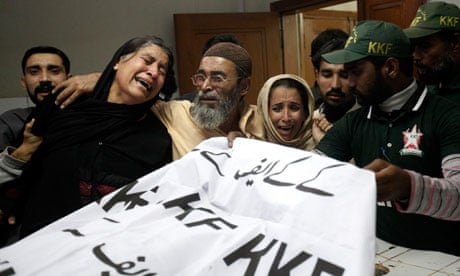Five female health workers vaccinating children against polio have been shot dead in Pakistan in a series of attacks blamed on Islamist militants. One victim was a 17-year-old schoolgirl volunteer.
Four of the killings, which officials said were carried out by masked men on motorbikes, took place in the southern city of Karachi, Pakistan's commercial capital, on the second day of a drive to eradicate the disease from the country.
The fifth, of the schoolgirl, occurred in the violent western city of Peshawar. According to some reports, a sixth health worker, a man, was also killed in Karachi.
It was not clear who was behind the shootings, but Taliban insurgents have repeatedly denounced the anti-polio campaign as a western plot.
The Pakistani government and United Nations partner organisations involved in the anti-polio campaign met after the killings to discuss the security situation and decided to temporarily suspend the campaign. In a joint statement the World health Organisation and United Nations CHildren's Fund (UNICEF) called on the leaders of "the affected communities" to do their utmost to protect health workers and create a secure environment.
"We're concerned for the safety of frontline workers. They are the true heroes," Michael Coleman, a spokesman for the United Nations Children's Fund, said.
The volunteers were taking part in a three-day government-led drive, supported by the World Health Organisation and Unicef, to vaccinate tens of millions of children at risk from polio in Pakistan.
After a decades-long struggle by multilateral organisations, governments and NGOs worldwide, the disease is now endemic only in three countries: Pakistan, Afghanistan and Nigeria.
Relatives said several of the victims had received death threats in recent days. Some Islamists and Muslim preachers in Pakistan and elsewhere say the polio vaccine is a western plot to sterilise Muslims to stop population growth. Other religious leaders have taken part in campaigns aimed at debunking that myth.
Resistance is particularly strong in Pakistan, where there has been a severe backlash against immunisation for polio and other diseases since the CIA used a Pakistani doctor, Shakil Afridi, to set up a fake vaccination programme as the agency closed in on the al-Qaida leader Osama bin Laden in his hiding place in the town of Abbottabad, in the north-western province of Khyber Pakhtunkhwa, last year.
In July, a Ghanaian doctor was shot in Karachi, a day after leaders of factions of the Pakistani Taliban backed a ban on immunisation in the country's restive tribal areas.
This month a teenage student and volunteer on a polio vaccination programme was murdered by gunmen in an eastern Afghan village.
Women and girls are frequent targets of militants. A veteran Swedish NGO worker who trained midwives was killed recently in the eastern city of Lahore. In October, the shooting of 15-year-old Malala Yousafzai by Islamic militants angered by her demands for education for girls made international headlines and provoked much debate in Pakistan. Yousafzai is recovering in a British hospital.
Officials said the girl killed in Peshawar had received repeated threats that had forced her to move between houses of friends and relatives at least three times in recent days. She was accompanied by her sister, who escaped unhurt.
Details remained sketchy of the attacks. The Peshawar incident took place in the Shagai suburb, which borders the lawless Mohmand tribal area, said Janbaz Afridi, a senior health official in Khyber Pakhtunkhwa.
In Karachi, the attacks occurred in three poor areas spread across the city. According to an official report seen by the Guardian, one was in the sprawling Orangi township. The second, in which two women were killed, took place in the eastern Landhi neighbourhood. A third attack was in Baldia town, in the west of the city. None of the victims appear to have had police protection.
Statistics released in October showed an improvement in the polio situation in Pakistan, with 47 children paralysed by the disease in 27 districts compared with 154 cases in 48 districts in 2011. However, in 2005 only 28 new cases were registered.
Fears of religious extremism in Karachi have grown in recent years. Large numbers of refugees from the violence-hit north-west have sought refuge there along with a number of senior militant leaders from groups including the Pakistani Taliban and al-Qaida. The influx has altered the demographic balance of the city and contributed to a recent surge in violence. However, extremist groups have been based in Karachi for many decades.
Officials say there is reason to be optimistic that polio can be eradicated in Pakistan. In neighbouring India, a mass vaccination campaign involving more than a million volunteers reduced cases nationally by 94% between 2009 and 2010, from 741 to 42, and down to the single case last year. A key factor was the support for the campaign of clerics from poor Muslim communities.








